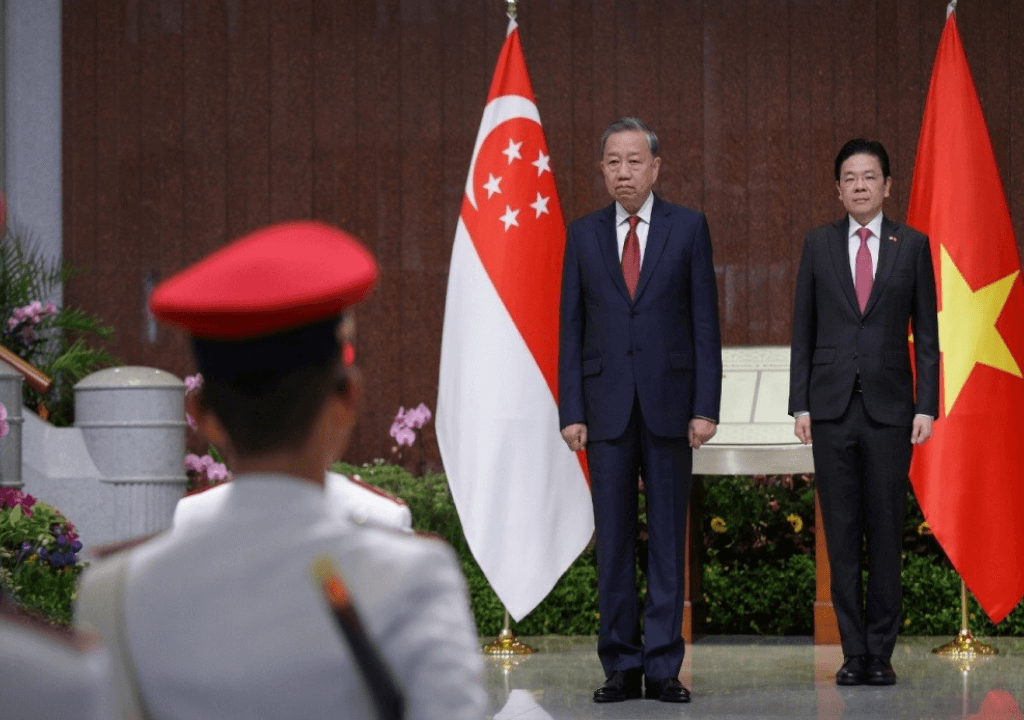Amid deglobalization and rising trade tensions, Singapore is strengthening its ties with regional markets. With U.S.-China friction intensifying and Trump threatening even allied nations, the city-state—keen on safeguarding its economic resilience—is deepening its engagement with ASEAN partners.
As part of this strategy, Singapore and Vietnam have agreed to elevate their relationship to a comprehensive strategic partnership. The decision came during a visit last week by To Lam, Vietnam’s general secretary and its most powerful political figure. Lam met with Singaporean Prime Minister Lawrence Wong and other senior officials to discuss expanding economic and security cooperation.
The visit led to several key agreements, including plans for collaboration on undersea cable development, digital connectivity, and cross-border data flows. Both sides also explored opportunities in green development, industrial park expansion, and regional stability, according to a joint statement.
Singapore wants Vietnam in
While maintaining strong ties with the U.S., China, and other major Asian powers, Singapore continues to expand its economic influence by fostering business opportunities. Vietnam, a rising manufacturing hub, has become a key part of this strategy. Strengthening economic ties with Vietnam allows Singapore to tap into a fast-growing market while mitigating risks from shifts in U.S. policy.
As ASEAN members, Singapore and Vietnam share strong commercial ties. Bilateral trade between the two nations reached $23.5 billion (€21.7 billion) last year, a 9.5% increase from the previous year. Singapore is also one of Vietnam’s top foreign investors, contributing approximately $10.2 billion—27% of Vietnam’s total foreign investment—according to official data.
With limited land, agriculture, and manufacturing capacity, Singapore relies on strategic partnerships to sustain its growth. However, overdependence on any single partner could disrupt its carefully balanced approach. By diversifying its alliances and expanding its economic network, Singapore reduces risks and strengthens its position as a key regional hub.
Friends With Benefits
Vietnam, aiming to achieve developed-nation status within the next five years, is reaping significant benefits from its growing partnership with Singapore. Amid rising tensions in the South China Sea, Hanoi is prioritizing stable relationships with key regional players, seeking security through closer ties with like-minded nations rather than relying on unpredictable global powers.
For over a decade, Vietnam has pursued a “Bamboo Diplomacy” strategy, carefully balancing relations with major global powers. However, its territorial dispute with China over the South China Sea remains a persistent challenge. Hanoi’s measured approach toward Beijing has sparked public frustration, with many viewing it as overly accommodating to a historical rival.
In recent years, Vietnam has expanded its diplomatic footprint, forging comprehensive strategic partnerships with countries such as Indonesia, Japan, and South Korea. Since taking office last August following the death of his predecessor, Nguyen Phu Trong, To Lam has accelerated efforts to deepen regional ties, further solidifying Vietnam’s position in Southeast Asia. So, Singapore and Vietnam stand as well-matched partners at a crucial moment.
Future of the Relationship
The future of Singapore-Vietnam relations appears increasingly robust. Vietnam, with its expanding manufacturing sector, gains from Singapore’s financial backing and infrastructure support, reinforcing their partnership amid regional uncertainty. At the same time, closer ties with Singapore provide Vietnam with greater strategic flexibility, reducing its reliance on China.
Singapore also views this partnership as an opportunity to strengthen Vietnam’s defense capabilities, enabling it to push back against China’s growing military presence in the South China Sea. If both nations can rally other Southeast Asian countries into their network, the entire region stands to gain, fostering stability and economic growth.







